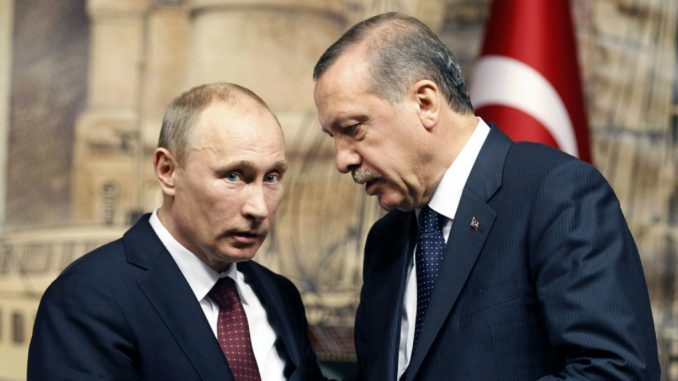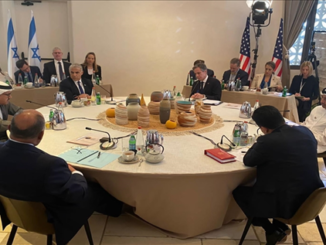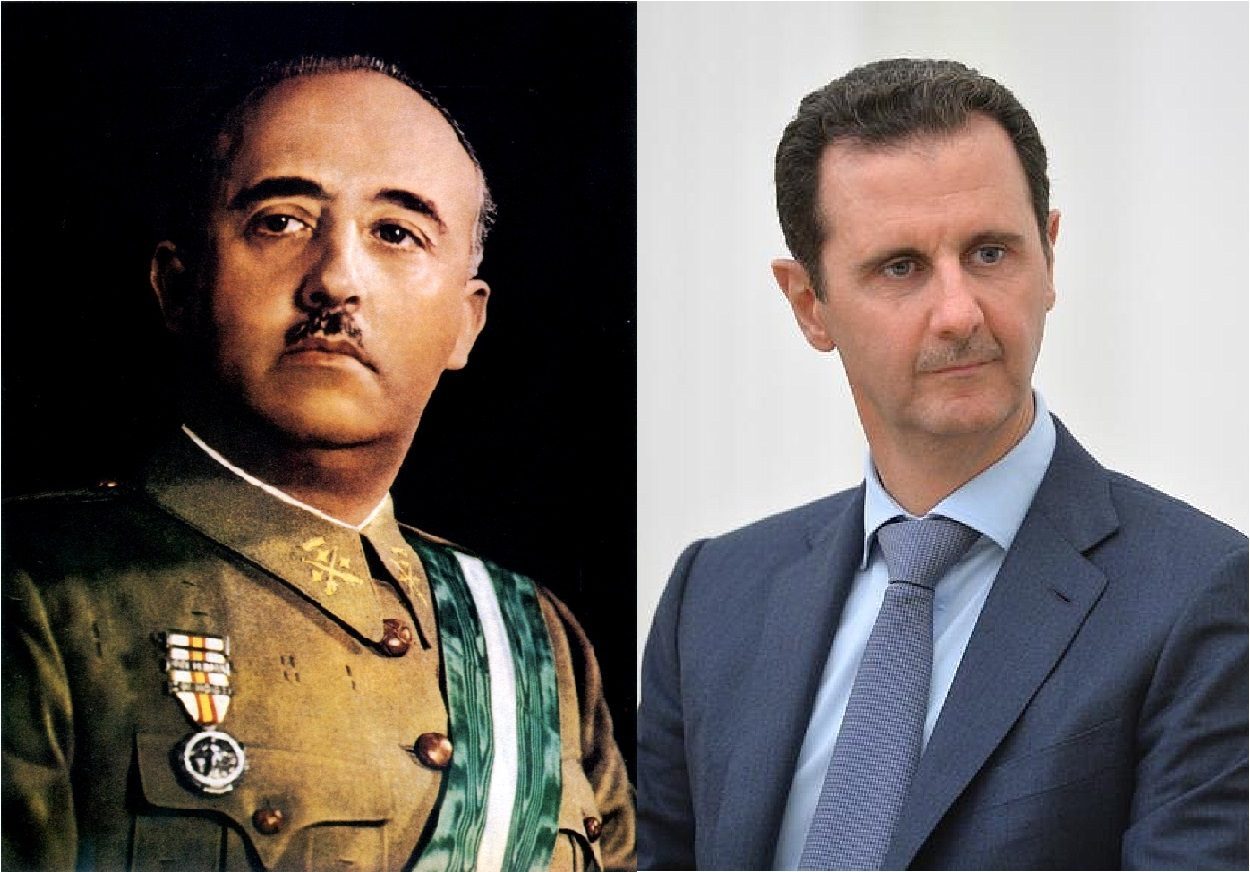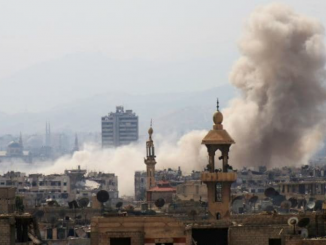
Turkey’s President said on Sunday that his country seeks to establish safe zones in Syria with the US help, despite Russia, his new ally, refused this move before.
Turkey’s military operation in Syria named Euphrates Shield, which was launched last August to drive Islamic State militants from its border and prevent Kurdish fighters from gaining ground and strengthening their positions, has changed the balance of power in northern Syria and added more tension to the already complicated area.
have managed to retake the ISIS stronghold of Jarabulus, alongside with al-Rai to the west and Dabiq city. Now their operation is focused on al-Bab as the last major stronghold for ISIS in northern Syria.
Turkey’s operations against ISIS aim at ending the group’s existence near its borders and the group’s ability to pose threat to its internal peace.
Turkey also attacked the YPG Kurdish militias ordering them to withdraw from East Euphrates region. The Turkish military also shelled Kurdish militias’ positions in northern Syria while the rebel forces clashed with them in many incidents and forced them to withdraw behind the Euphrates river.
The Turkish administration had differences with the Obama administration in the Kurdish issue, and thus Turkey moved to Russia and coordination with the US in al-Bab battle was largely absent.
With Russia, Turkey became one of the peace guarantees in Syria and a part in securing a suitable environment for the political process that will end the crisis, while the US was greatly sidelined.
However, Erdogan hopes that the relations can rest again under Trump and the both countries cooperate to achieve their mutual interests.
Turkey seeks to establish safe zones in Syria
Erdogan’s comments were declared on Sunday as he was giving a brief of developments in al-Bab liberation battle.
“Al-Bab is now besieged from all fronts … Our forces along with the Free Syrian Army [fighters] have reached the [town] center. And the ISIS forces are now in the process of leaving Al-Bab,” he told a press conference at Ataturk International Airport.
Erdogan said it was “only a matter of time” before the allied forces took full control of the flashpoint town in northern Syria.
Erdogan has made it clear it many times that his country’s operations aim at fighting the Kurdish militias as well as defeating ISIS, as both of them resemble a threat to Turkey’s internal security.
“Al-Bab is about to be captured. Manbij and Raqqah are next,” Erdogan said, adding their number one priority was to form a safe zone in the country.
Erdogan reiterated that Turkey does not have any plans to stay in Syria after the operations end, saying Turkey’s only goal is to “clear this region of terrorism”.
“The goal is to establish a safe, terror-free zone of 4 to 5,000 kilometers, and to prevent migration from Syria, and ensure the return of [Syrian] people who live now in our camps.
“Of course, in order to do this, we also would like to almost build new cities there. I have shared this with Mr. Trump and coalition forces, including Germany in particular,” he added.
“The next step is to establish a no-fly zone,” Erdogan said. “Then they [the Syrians] will be able to establish their national army and feel themselves safe.”
“The train-and-equip program is also of utmost importance,” he noted, saying the “FSA is one such army trained and equipped as part of this program,” carried out by Turkey and the U.S.
Joint goals with Trump
He said last week he would “absolutely do safe zones in Syria” for refugees escaping violence and that Europe had made a mistake by admitting millions of refugees.
Erdogan has supported this idea in his recent phone call with Trump, among other issues that reflect a state of understanding between the two leaders.
Turkish officials said that Erdogan urged the US president to curb Washington’s support for Syrian Kurdish militia, known as the YPG, and cited Turkish progress in al-Bab to argue it would be a better partner in the fight for Raqqa.
In addition, the two leaders had touched on issues including a “safe zone”, as well as the regional migrant crisis and the fight against terrorism. Turkey has long advocated a secure zone for displaced civilians in Syria threatened by Islamist militants or forces fighting for Syrian President Bashar al-Assad.
Erdogan’s mention of this particular point in his speech today might hint to the start of cooperation between the two powers, though such a move may anger Russia.
Russian refusal and the tension with Turkey
The US decision to make the safe-zones put it again on odds with Russia, which became the prominent player in the Syrian case and forces its view of the political solution after the previous US administration was weak and lost its chance.
The Kremlin meanwhile said a plan for safe zones should be thoroughly considered.
Asked to comment on the draft executive order, Russian President Vladimir Putin’s spokesman, Dmitry Peskov, underlined the importance to “thoroughly calculate all possible consequences” of the measure. He noted that “it’s important not to exacerbate the situation with refugees.”
Peskov said the Trump administration did not consult Russia before announcing the plan to establish safe zones.
“No, our American partners did not consult with us. It’s a sovereign decision,” Peskov said on a conference call with reporters.
“It is important that this (the plan) does not exacerbate the situation with refugees, but probably all the consequences ought to be weighed up.”
Therefore, Turkey’s cooperation with the US in this matter especially and on the Syrian issue, in general, may have created tension between the two new allies, and the latest incident in al-Bab city might be a warning.
A Russian warplane hit a building housing Turkish soldiers in Al-Bab at 8:40 am local time, the Turkish General Staff said.
Russian President Vladimir Putin was quick to call his Turkish counterpart, Recep Tayyip Erdogan, to offer condolences while the Kremlin spokesman Dmitry Peskov told reporters the pilots were killed due to lack of coordinate.
“Turkish servicemen were killed as a result of incoordination in Russian Air Force airstrikes against terrorists during the joint operation to liberate al-Bab,” Peskov said.
However, the Turkish military insisted the troops had been at the building for 10 days and that Russia had been advised of their position on Wednesday.
The Turkish military subsequently issued its statement challenging Peskov’s account and stressing that the soldiers’ position had been communicated the previous day to both officers at Russia’s Hmeymim airbase in Syria and the Russian military attache in Ankara.
The Syrian crisis began as a peaceful demonstration against the injustice in Syria. Assad regime used to fire power and violence against the civilians and led to armed resistance. 450.000 Syrians lost their lives in the past five years according to UN estimates, and more than 12 million have lost their homes.



